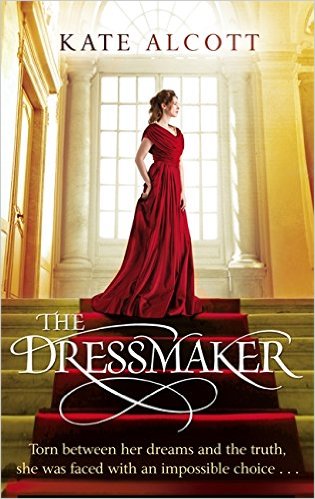
THE ship, bow first, was slowly sinking into the water. People began tumbling like broken dolls from the decks, flopping, flailing into the sea. There was a huge cracking sound-and then the Titanic disappeared.
Kate Alcott, a pseudonym for Patricia O’Brien, used transcripts of the US Senate hearings over the sinking of the Titanic in April 1912. Some of the characters are based on real characters who either survived the sinking such as the Duff Gordons and Margaret Brown as well as Senate William Alden Smith who presided over the hearings, otherwise Alcott admits to this being a work of fiction with the inclusion of factual evidence. I would highly recommend this book. Gripping from start to finish and I mean that!
Tess Collins is the kind of heroine I admire and strongly approve of. She comes from modest roots, a large family struggling to make ends meet. Her father is critical and a man of the time, denying equal rights to women. Tess is constantly haunted by his oppressive and deprecating tones: You’re a farm girl, do your job, keep your head down and don’t put on airs. He was under the impression that she would ruin her life through defiance. Thankfully, Tess is a stubborn lady and is determined to make her life better not wreck it. She proves to be a good role model just like her mother: look for opportunity. Keep your head up, not down. Don’t settle for safety. Push forward-you are not foolish to try. What a far cry from her father’s damning thoughts: Watch out, foolish girl.
Tess feels ashamed of working as a servant, an image of servitude when she is duped into accepting work in Cherbourg. She was a good seamstress and we see evidence of this when she starts working for the indomitable Lady Gordon Duff, a famous dress designer, the person she most admired in the world. Like many others, Tess is on the cusp of a new life filled with immense possibilities, a dream come true, a wonderful fantasy. Sailing on the Titanic with the famous and wealthy. Two infatuated men, one a rich American businessman, Jack Bremerton, the other a talented member of the crew, Jim Bonney who sweep her off her feet.
Wonderful and then…the jolt, the slight bump followed by a sudden silence and the sadly ironical remark: We bumped into an iceberg but all is well.
Bumping, scrambling, shouting. Suddenly there was an acrid, sweaty smell of human fear in the salt air. Children wailing. Panic everywhere. Desperation. Followed by the horrors that have been well-documented over the years.
That this ruined people’s lives is an understatement and I mean for those who were lucky enough to survive. We are told that 706 survived out of a passenger list of 2,223 and that out of these 60% of the first-class passengers survived, most of them women. In steerage, it was 25%.
In reality, the Duff Gordons and their secretary escaped in a lifeboat that could have held 40-50 people instead of 12. In The Dressmaker Alcott explores how the couple were vilified by the press and people in both the USA and the UK. Lady Duff Gordon is subpoenaed to give a statement of what happened in Lifeboat One, contradicting Jim Bonney’s statement. There were crimes against humanity, moral crimes, tales of bribery and refusals to fill the boat and look for survivors.
Marrying into the titled class. Gave her licence to be cold about people’s lives.
And this is when Tess has to grow up, think for herself and decide on what she really wants out of life. Should she stand up, challenge and do what she wants to do OR should she be careful, be loyal and challenge nothing? Can she remain with her ideal, continue to admire and respect her after learning how self-absorbed, selfish and a bit careless the woman is?
People choose whatever they want to believe and declare it true. What is the truth? Will anyone accept any liability for so many loss of lives? Our poor heroine is filled with so much uncertainty. How could she be sure of anything anymore? She has crucial decisions to make over her future with Lady Duff Gordon and her love life.
Interestingly, her mother’s advice and her own common sense are pivotal in her decision making. She certainly is true to herself and full of hope not despair.
She would be strong and not always too careful, not settle for a smaller life, and face what was true.
As she walked through the streets of New York she felt strangely serene she was just a servant girl from Cherbourg without a job but she had a life and a future. That was important.
Jack Bremerton called her extraordinary as a character and I would endorse this. She is the kind of person one would feel immense pride and joy to be with and I finalise by repeating what a role model she would make for women around the world today. I rest my case.
Publisher: Sphere (Little Brown Book Group) ISBN: 978-0-7515-4923-2
REVIEW it by Carol Naylor
www.carolesleynaylor.wordpress.com








